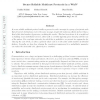Free Online Productivity Tools
i2Speak
i2Symbol
i2OCR
iTex2Img
iWeb2Print
iWeb2Shot
i2Type
iPdf2Split
iPdf2Merge
i2Bopomofo
i2Arabic
i2Style
i2Image
i2PDF
iLatex2Rtf
Sci2ools
130
click to vote
ICDCS
1997
IEEE
1997
IEEE
Secure Reliable Multicast Protocols in a WAN
A secure reliable multicast protocol enables a process to send a message to a group of recipients such that all correct destinations receive the same message, despite the malicious efforts of fewer than a third of the total number of processes, including the sender. This has been shown to be a useful tool in building secure distributed services, albeit with a cost that typically grows linearly with the size of the system. For very large networks, for which this is prohibitive, we present two approaches for reducing the cost: First, we show a protocol whose cost is on the order of the number of tolerated failures. Secondly, we show how relaxing the consistency requirement to a probabilistic guarantee can reduce the associated cost, effectively to a constant.
Correct Destinations | Distributed And Parallel Computing | ICDCS 1997 | Reliable Multicast Protocol | Secure Distributed Services |
Related Content
| Added | 06 Aug 2010 |
| Updated | 06 Aug 2010 |
| Type | Conference |
| Year | 1997 |
| Where | ICDCS |
| Authors | Dahlia Malkhi, Michael Merritt, Ohad Rodeh |
Comments (0)

